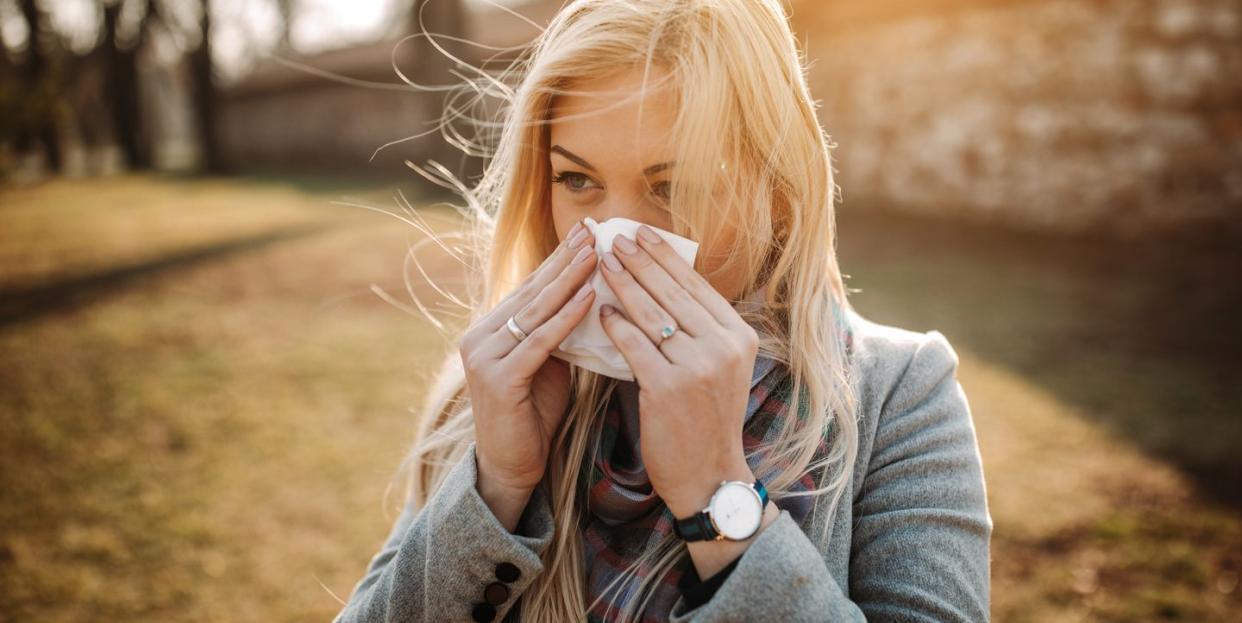COVID-19 Symptoms Can Feel Like Fall Allergies, but They Have a Few Key Differences

- Oops!Something went wrong.Please try again later.
If you suddenly come down with a runny nose, headaches, and sore throat, it’s understandable that you might panic and assume you have COVID-19, especially as cases continue to rise in the U.S. But as weeds become rampant and moldy leaf spores infiltrate the air, your fall allergies may start causing lots of cold- and COVID-like symptoms, too.
Due to the ongoing spread of the novel coronavirus, if you’re experiencing any symptoms linked to COVID-19, it’s a good idea to check in with your doctor, just in case.
However, experts say there are a few key differences that can help steer you in one direction or the other. Here’s what you should know about how COVID-19 and fall allergy symptoms overlap and differ, plus what you can do to stay healthy.
Related video: How to make a DIY no-sew face mask
COVID-19 vs. fall allergy symptoms
There is some overlap between COVID-19 and allergies, but they do have their own set of symptoms. According to the Centers for Disease Control and Prevention (CDC), COVID-19 is known to cause the following symptoms. Keep in mind that this is not a definitive list, as experts are still studying side effects of the virus:
Fever or chills
Cough
Shortness of breath or difficulty breathing
Muscle or body aches
New loss of taste or smell
Congestion or runny nose
Nausea or vomiting
Allergies can cause the following symptoms, per the Asthma and Allergy Foundation of America (AAFA):
Watery, itchy, or generally irritated eyes
Runny nose or nasal congestion
Sneezing
Headaches
Rashes or hives on the skin
Itchy throat
Aggravated asthma symptoms, including coughing or wheezing
In severe cases, trouble breathing or anaphylaxis (a life-threatening allergic reaction)
How can you tell if you’re dealing with COVID-19 or fall allergy symptoms?
Experts say there are a few major clues. First, one of the hallmark signs of COVID-19 is a fever (a temperature of 100.4° F or higher)—a symptom that allergies do not cause, says Purvi Parikh, M.D., an allergist and immunologist with the Allergy & Asthma Network.
Allergies are also more likely to lead to itchy eyes and skin reactions (like redness, swelling, or general irritation), while this isn’t as common with COVID-19, Dr. Parikh says. COVID-19 is also much more likely to cause a new lost sense of smell or taste, which research shows is becoming more and more common with the virus.
Your personal history matters, too. “Most people know their allergy symptoms—they recognize them and have them seasonally,” says Fred Pelzman, M.D., an internist at Weill Cornell Medicine and NewYork-Presbyterian. “But we have seen a range of symptoms with COVID-19. I’ve seen people who have just had a runny nose, a little cough, and watery eyes.”
The confusion is understandable, Dr. Pelzman adds. “Nothing is an allergy symptom that couldn’t be COVID,” he says. “If patients have always felt this way with their allergies, that’s probably a good indicator it’s allergies. But if you get a fever, which you don’t have with allergies, or never had a cough or shortness of breath with allergies, it could be COVID.”
How are allergies treated compared to COVID-19?
As of now, there is no specific treatment for COVID-19. However, for patients who are not hospitalized, supportive care is recommended. This includes drinking plenty of fluids, getting lots of rest, and taking over-the-counter medication to reduce a fever and minimize body aches as the illness runs its course.
Allergies have a range of treatment options, though. The AAFA says you can generally tackle symptoms with OTC antihistamines like Allegra, Zyrtec, and Claritin, decongestants, nasal steroid sprays like Flonase, and steroid creams if needed for rashes and itchy skin.
“If your symptoms respond to your allergy treatment and get better, it’s likely you’re dealing with allergies,” Dr. Pelzman says. “COVID symptoms tend to be longer lasting and don’t respond to allergy treatments.”
How to protect yourself from COVID-19
The CDC specifically recommends taking the following precautions to keep yourself and those around you safe:
Wash your hands regularly with soap and water for at least 20 seconds.
Use alcohol-based hand sanitizer when you do not have access to a sink.
Avoid touching your eyes, nose, and mouth with unwashed hands.
Avoid close contact with people who are sick (and stay home if you feel sick).
Try to keep at least six feet between yourself and people who are outside your household.
Cover your mouth and nose with a face mask when you’re around others in public.
Cover coughs and sneezes.
Clean and disinfect high-touch surfaces daily.
Bottom line: If you’re having unusual symptoms, talk to your doctor.
They can help ID the cause of what’s ailing you, recommend testing, and help guide you on the next best steps, whether that includes starting a new allergy medication or isolating at home until you’re sure you’re in the clear of COVID-19.
Support from readers like you helps us do our best work. Go here to subscribe to Prevention and get 12 FREE gifts. And sign up for our FREE newsletter here for daily health, nutrition, and fitness advice.
You Might Also Like

